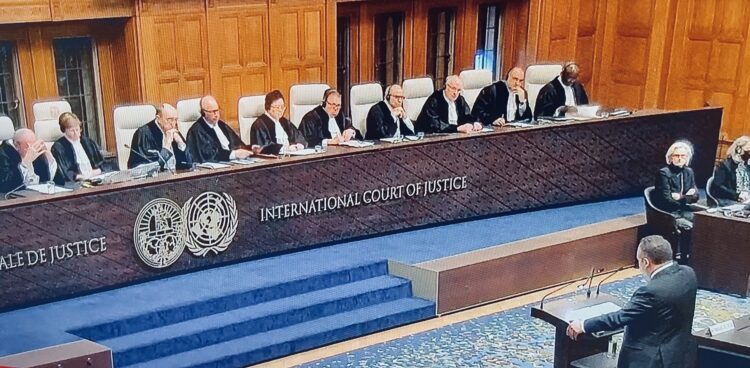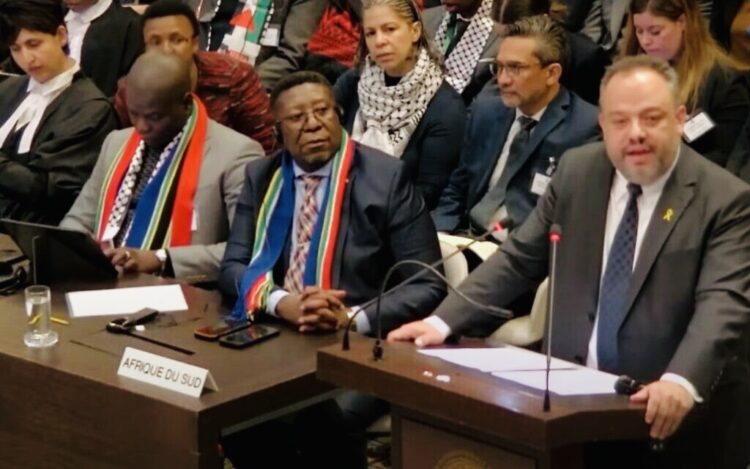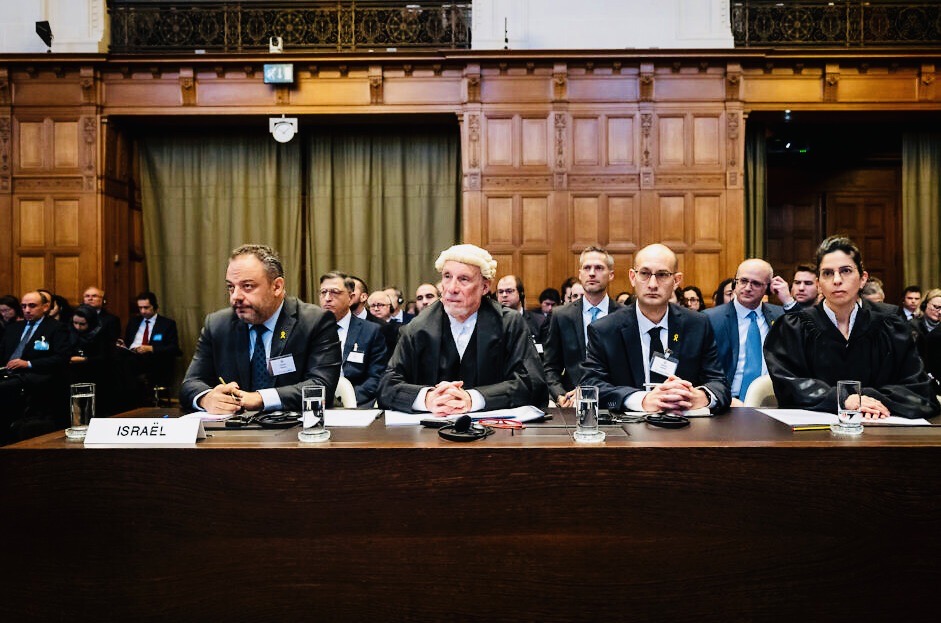South Africa has gone down a very crooked road in accusing Israel of “genocidal intent” in its military campaign to eradicate Hamas and remove it from power. In light of the atrocities that Hamas perpetrated last October in southern Israel, which ran the gamut from mass murder to sexual assault, Israel had every moral and legal right to launch a massive counter-attack in self-defence against a venal, blood-thirsty enemy that is only too eager to commit the same crimes all over again if given the opportunity.
In taking its case to the International Court of Justice in The Hague, South Africa argued that Israeli politicians and army commanders explicitly declared a “genocidal intent” to wipe out not only Hamas but the civilian population of the Gaza Strip as well. South African lawyers based their tendencious argument on the 1948 Genocide Convention, which defines genocide as “acts committed with intent to destroy, in whole or in part, a national, ethnical, racial or religious group.”
As Israeli lawyers correctly pointed out, Israel’s offensive has targeted not civilians but Hamas’ military infrastructure, which was deliberately placed in or near civilian sites such as high-rise apartment buildings, schools, universities, mosques and even hospitals. Israel had no alternative but to attack these places in order to achieve its just objectives.

Cynically enough, Hamas leaders completely understood that thousands of ordinary Palestinians would be unnecessarily killed under such dire circumstances. But Hamas also calculated that their “martyrdom” would ignite a global uproar and tarnish Israel’s image, which is exactly what happened when the International Court of Justice accepted South Africa’s application.
Tal Becker, a lawyer for Israel, reminded the panel of judges in preliminary hearings that the Genocide Convention was not designed to address the brutal impact of intensive hostilities on the civilian population, but to address crimes against humanity committed by one side or the other.

From the outset of this war, Israel has instructed Palestinian civilians to move away from battle zones and allowed humanitarian supplies to reach them under the most difficult of conditions.
It should be clear that the humanitarian crisis was effectively created by Hamas after it decided to allocate all of its scarce resources to destroying Israel.
Contrary to South Africa’s claim, Israel — the home of tens of thousands of Holocaust survivors — had no intention of harming civilians, though accidents were bound to happen during the fog of war. But even to remotely compare their deaths to Nazi Germany’s Final Solution of European Jews, as South Africa appeared to suggest, is nothing less than utterly grotesque and shameful, a blatant inversion of the Holocaust.
It is true that some enraged Israeli officials made undiplomatic, inappropriate and offensive comments with respect to Gaza and the Palestinians, particularly right after the October 7 massacre, when passions were riding extremely high in Israel and Israelis were still barely coping with its traumatic effects.
Yet, as Malcolm Shaw, one of the lawyers representing Israel, said in his lucid presentation, South Africa distorted their unhelpful remarks so as to artificially establish “genocidal intent” by Israel.
And as he added, only the small Israeli war cabinet determines Israeli policy in Gaza. “To produce random quotes which are not in conformity with government policy is misleading at best,” said Shaw, citing Israel Defence Forces’ orders to differentiate between military and civilian targets.
Shaw also said that Prime Minister Benjamin Netanyahu and Defence Minister Yoav Gallant have repeatedly said that the main objective of the war is to destroy Hamas, not the Palestinian people.
Gilad Noam, the lawyer who presented Israel’s closing arguments, made an important point when he told the court that terrorists will be emboldened if it accepts South Africa’s specious claims.
“Entertaining the applicant’s request would weaken efforts to punish genocide, and instead of (the court) being an instrument to prevent terrorist horrors would turn it into a weapon in the hands of terrorist groups that have no regard for humanity and rule of law,” he said.
As for South Africa’s request to impose provisional measures on Israel, such as an immediate ceasefire to end the war, Noam said this would set an unfortunate precedent. “It would signal to terrorist groups that they can commit war crimes and crimes against humanity and then seek the protection of this court.”
Alluding to this scenario, Israel’s Foreign Ministry accused the South African government of acting as the “legal arm” of the Hamas and charged that it had “utterly distorted the reality in Gaza … and completely ignored the fact that Hamas terrorists infiltrated Israel, murdered, executed, massacred, raped and abducted Israeli citizens … in an attempt to carry out genocide.”
South Africa, as the ministry noted, has presented “false and baseless claims“ to the court and has proven itself to be acting in a spirit of hypocrisy.
Nine years ago, the then president of Sudan, Omar Hassan al-Bashir, who had been convicted of genocide and war crimes by the International Criminal Court, attended a summit in South Africa, yet the South African government refused to arrest him. And in 2022, South Africa declined to condemn the Russian invasion of Ukraine.
Although the South African presentation against Israel cannot really be taken seriously on its merits, it could have serious consequences should the court rule in South Africa’s favor.
It could conceivably lead to international sanctions against Israel, a fate that befell apartheid South Africa, and it could result in the prosecution of government ministers and army officers. It could also increase pressure on Israel to accede to a premature ceasefire, which could only benefit Hamas at this juncture.
Thankfully, the United States, Israel’s oldest ally, has dismissed South Africa’s case as “meritless.”
Germany, where the Holocaust was conceived during the Nazi interregnum, has sharply rejected South Africa’s allegation and announced that it will intervene as a third party before the International Court of Justice. As German government spokesman Steffen Hebestreit said, Israel was “defending itself” in the face of the “inhuman” onslaught by Hamas on October 7.
Canada, one of Israel’s friends, issued a rather lukewarm statement. As Prime Minister Justin Trudeau said, “Our wholehearted support of the International Court of Justice and its processes does not mean that we support the premise of the case brought forward by South Africa.”
It goes without saying that Canada’s reaction should have been far more supportive of Israel.
The New Democratic Party and the Green Party unambiguously endorsed South Africa’s position. One can only hope that this will cost them dearly in the next federal election.
